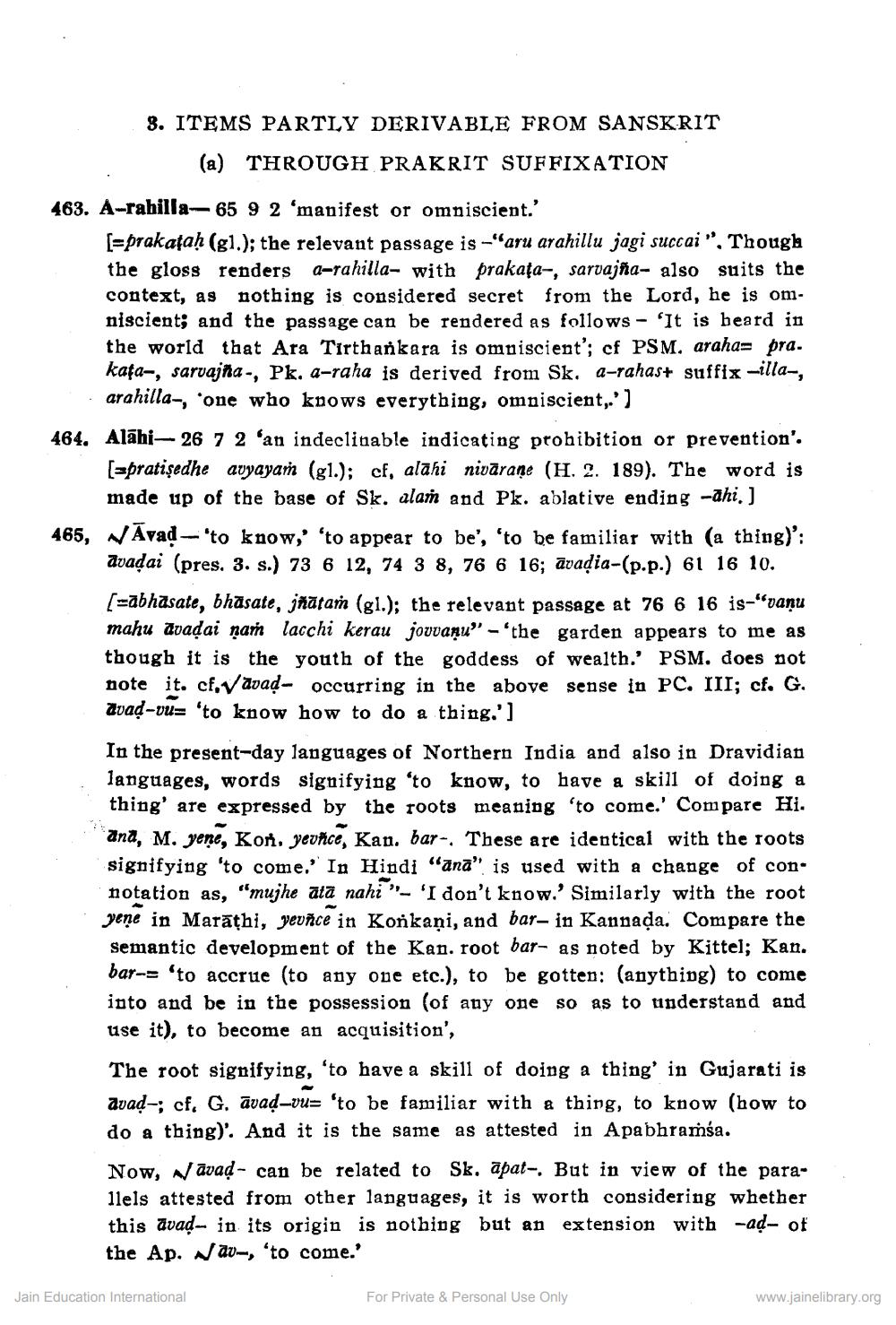________________
8. ITEMS PARTLY DERIVABLE FROM SANSKRIT (a) THROUGH PRAKRIT SUFFIXATION
463. A-rabilla-65 9 2 'manifest or omniscient.'
[=prakataḥ (gl.); the relevant passage is -"aru arahillu jagi succai". Though the gloss renders a-rahilla- with prakata-, sarvajña- also suits the context, as nothing is considered secret from the Lord, he is omniscient; and the passage can be rendered as follows 'It is heard in the world that Ara Tirthankara is omniscient'; cf PSM. araha= pra. kata-, sarvajña-, Pk. a-raha is derived from Sk. a-rahas+ suffix -illa-, arahilla-, 'one who knows everything, omniscient,.']
464. Alähi-26 7 2 'an indeclinable indicating prohibition or prevention'. [-pratiṣedhe avyayam (gl.); cf, alahi nivaraṇe (H. 2. 189). The word is made up of the base of Sk. alam and Pk. ablative ending -ahi,] 465, Avaḍ—'to know,' 'to appear to be', 'to be familiar with (a thing)': avadai (pres. 3. s.) 73 6 12, 74 3 8, 76 6 16; avaḍia-(p.p.) 61 16 10.
[=abhasate, bhāsate, jñātaṁ (gl.); the relevant passage at 76 6 16 is-"vanu mahu avaḍai nam lacchi kerau jovvanu"-'the garden appears to me as though it is the youth of the goddess of wealth.' PSM. does not note it. cf.vavad- occurring in the above sense in PC. III; cf. G. avad-vu- 'to know how to do a thing.']
In the present-day languages of Northern India and also in Dravidian languages, words signifying 'to know, to have a skill of doing a thing' are expressed by the roots meaning 'to come.' Compare Hi. ana, M. yene, Kon, yevñce, Kan. bar-. These are identical with the roots signifying 'to come.' In Hindi "ana" is used with a change of con. notation as, "mujhe ātā nahi "- 'I don't know.' Similarly with the root yene in Marathi, yevñce in Konkani, and bar- in Kannaḍa. Compare the semantic development of the Kan. root bar- as noted by Kittel; Kan. bar- 'to accrue (to any one etc.), to be gotten: (anything) to come into and be in the possession (of any one so as to understand and use it), to become an acquisition',
The root signifying, 'to have a skill of doing a thing' in Gujarati is avad-; cf. G. avaḍ-vu- 'to be familiar with a thing, to know (how to do a thing)'. And it is the same as attested in Apabhramśa.
Now, avaḍ- can be related to Sk. apat-. But in view of the parallels attested from other languages, it is worth considering whether this avad in its origin is nothing but an extension with -ad- of the Ap. /av-, 'to come.'
Jain Education International
For Private & Personal Use Only
www.jainelibrary.org




